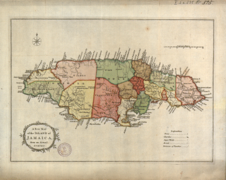Joseph Jackson (1769-1808)
Monday, June 27, 2016

Our occasional series RISM A–Z brings us to the letter J. Let’s turn our eyes to the island of Jamaica and the composer and missionary Joseph Jackson (1769-1808).
Joseph Jackson is one of the very few people in the RISM online catalog who has connections with Jamaica. The son of Moravian missionaries from England, Jackson was born on the Moravian settlement of Old Carmel in western Jamaica, which was then part of the British West Indies. Jackson’s parents had arrived in Jamaica in 1769, but his father suddenly died shortly afterward. Joseph was born one month later, on December 11 or 16, 1769. In 1770, the widow Jackson returned to England with her baby.
In Fulneck, England, a Moravian settlement near Leeds, Jackson was active as a music teacher sometime before 1796. Jackson married Rachael Oates (1771-1840) in Calverly, Yorkshire, in 1799. Beginning in 1800, the couple served as missionaries in Jamaica and had four children there. The Jacksons sailed to Jamaica on February 5, 1800 as part of a fleet of around 100 ships and connected with another mission in Barbados on April 10, just before Easter. A few days later they continued for Jamaica, landing on April 24. Jackson recorded his initial impression in his diary: “The distant view of the bay surrounded by mountains covered with beautiful verdure, had already delighted us from the ship.” They landed at Black River Bay and then continued the approximately 20-mile journey by land to Carmel. Jackson wrote that the two men who accompanied him on this last bit of the journey, Billy and Quaco, “remembered my father & mother & me, an infant, very well, & rejoiced much to see me, as I did to see them.”
The Moravian Church’s mission at the sugar estate known as Mesopotamia, located in the Westmoreland parish, is where Joseph Jackson and his growing family spent the next eight years. Richard S. Dunn’s recent A Tale of Two Plantations: Slave Life and Labor in Jamaica and Virginia (Cambridge, MA: Harvard University Press, 2014) details daily life there. Mesopotamia had a Moravian mission beginning in 1758, due to the influence of Mesopotamia’s owners at the time, who were themselves Moravian. This estate, like the 60 other sugar estates in the region, relied on forced labor. When Mesopotamia came under the ownership of Joseph Foster Barham II in 1790, the estate had 300 slaves who lived and worked there. Jackson was responsible for church services that were attended by enslaved people, about 40 of whom were baptized in the faith. Jackson died on the island on December 8 or 9, 1808.
Neither Jackson’s diary nor Dunn’s study mention the role that music played in the missionary’s life, but the RISM online catalog documents 17 musical sources by Jackson. The manuscripts are not in Jackson’s hand, and almost all of the vocal music is in German. Most of the manuscripts are located today at the Unitätsarchiv der Evangelischen Brüder-Unität (D-HER) in Herrnhut, the headquarters of the church. Of these works, three have concordant sources in Poland and Denmark. One vocal work is only in Poland. The instrumental Adagio is only in Denmark.
Instrumental music:
Adagio for harpsichord (1 copy)
Sacred vocal music:
Bleibet in mir und ich in euch; Soprano, strings, cembalo (1 copy)
Er sende dir Hülfe vom Heiligtum; Chorus, strings, organ (5 copies, 1 in Poland)
Friede sei mit dir; Soprano, strings, cembalo (2 copies)
Go my soul go every day; Soprano, strings, basso continuo (2 copies, 1 in Poland)
O angenehme Augenblicke; Chorus, cembalo (5 copies, 1 in Denmark)
Wir flehen vor deinem Angesicht; Chorus, strings, basso continuo (1 copy in Poland)
These manuscripts can only be given approximate dates, so we do not know for certain from what point in Jackson’s life these works came into being. Dunn writes that after Jackson’s death, it took two years for the church to find a successor to Jackson, during which time the mission house at Mesopotamia fell into a state of disrepair. Did Jackson bring any manuscripts over to Jamaica, and did any manuscripts remain after this? Research on Jackson and other Moravian musicians from around this time (many of whose works are at the Unitätsarchiv and described in RISM) can help shed light on the role of music and composition in the lives the church’s members.
Special thanks to Terry Shawe, great-great-great grandchild of Joseph Jackson, for his kind assistance with providing biographical details and a copy of Jackson’s diary of his voyage to Jamaica.
Image: “A New map of the island of Jamaica, from an actual survey” (London? 1773?). Library of Congress Geography and Map Division.
Share Tweet EmailCategory: RISM A-Z

